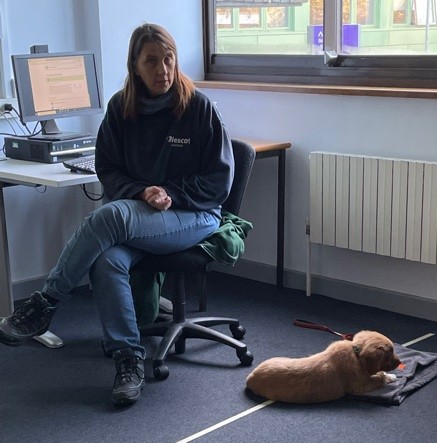Free online learning for adults: click here
Free online learning for adults: click here
-e4e89f4f4f4dabb3b92aed8760c1cf43.JPG)
Nescot has got its own trainee therapy dog to support students’ mental health and wellbeing.
Rhubarb, a six-month-old Nova Scotia duck tolling retriever, will work with the college’s safeguarding team as well as with various departments to support teaching and learning.
The effect of therapy dogs on students’ attendance, retention and achievement has long been documented, but research increasingly shows a therapeutic effect on mental health too.
“Rhubarb is still very young and new to his role, but the effect he is having already is quite remarkable,” said Zoe Brown, Head of Animal Studies and Catering at Nescot.
“The students love having him around, and although he’s still very much in training he is already having success in terms of attendance and achievement with the groups he’s working with.”
The idea of bringing a therapy dog to Nescot was initially suggested after concerns about rising mental health issues among students, which has been attributed in part to the effect of the pandemic.
Rhubarb can be used to support young people who are experiencing difficulties outside of college, as well as becoming an incentive for attendance, timekeeping, and achievement.
One of his duties is to patrol the corridors during breaks and lunchtime to provide company, reassurance and a listening ear for students who are feeling anxious or lonely.
“We are very clear that Nescot is a safe haven for our students; that whatever else is happening in their lives this college is a place where they know they are safe and supported,” Zoe said.
“Rhubarb is already a key part of that. People who are feeling in distress often gravitate towards dogs because they are such a calm, constant and non-judgmental companion.”
Cliff Shaw, Deputy Principal at Nescot, said: “Rhubarb has become a fantastic member of our team. He’s great with the students, and they love him.
“He has helped to build their confidence greatly since his arrival, and we are really excited to see what he will do as he grows up with us.”
Zoe worked closely with Canine Assisted Learning (CAL) to find out more about what therapy dogs do, how they can be trained to support young people and the impact they can have.
CAL helped to select Rhubarb when he was three weeks old, working with Zoe and a breeder to find a calm and polite puppy who particularly liked people.
Rhubarb, who now has his own college ID badge, started to work with Zoe when he was 10 weeks old, starting with gentle training and moving to online sessions for Zoe and practical assessments for them both.
“At first we were getting Rhubarb used to the college, such as being around different people and in different types of teaching environments,” Zoe said.
“He was scared of automatic doors at first, and unsure about stairs and lifts, so we spent a lot of time at college in the evenings, going up the stairs and down the lifts to help him feel comfortable.”
While he’s in training, Rhubarb is working with a Level 3 group of Animal Management students as well as a degree-level group.
“Rhubarb’s welfare is paramount,” Zoe said. “He is a working dog, so he has to have regular breaks and be able to switch off.”
Training for Rhubarb and his four handlers will continue until the end of this academic year, with a busy schedule of assessments ahead of him, which is something the students identify with.
From next September he will start working regularly with the safeguarding team, helping students in crisis.
Nescot offers Animal Management qualifications from Level 1 to university-level. To find out more about the department, click here.
To find out more about how the college supports students, click here.
